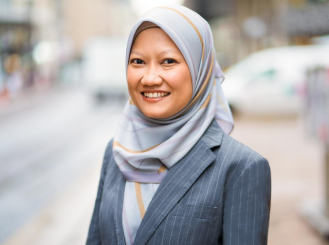Nov 03, 2023
By Katherine H. Crawford, MA, PMP, ASCO Communications
In 2009, ASCO launched its Leadership Development Program, providing mid-career-level members with leadership skills training and experiences to become future leaders at ASCO and in other areas of medicine. ASCO’s expertise in leadership development in oncology has generated interest in collaborating with the organization in this important area.
The Leadership Programme for Women in Oncology (LPWO) represents such a collaboration between ASCO and the City Cancer Challenge Foundation (C/Can), which aims to improve access to quality cancer care in cities in low- and middle-income countries. The training portion of the LPWO concluded in June 2023 with 10 mid-career oncologists having completed courses designed to strengthen leadership mindsets and skills. Over the course of a year, the participants—all of whom are working to improve access to equitable, high-quality cancer care in their communities—met virtually, in person, and with mentors.
ASCO and C/Can jointly developed the LPWO under the direction of ASCO volunteers Frank D. Ferris, MD, and Shannon Y. Moore, MD, MPH, drawing on ASCO’s experiences in leadership training and mentorship. The program supports C/Can’s efforts to improve and sustain access to equitable, high-quality cancer care for city-led cancer solutions (to which ASCO also contributes through training in multidisciplinary care).
Each C/Can city—of which there were 10 at the time the LPWO was established—participated in a competitive selection process for this program. The cities and their 2023 participants are:
- Arequipa, Peru: Livia Lucila Martínez Ocola, MBBS, MD
- Asunción, Paraguay: Jazmin Servin Brizuela, MD
- Cali, Colombia: Carolina López Ordóñez, MD
- Greater Petaling, Malaysia: Suniza Binti Jamaris, MBBS, MSurg
- Kigali, Rwanda: Diane Andrea Ndoli, MMEd
- Kumasi, Ghana: Vivian Paintsil, MBChB, FWACP, FGCPS
- León, México: Karina Senyase Zamarripa Martinez, MD
- Nairobi, Kenya: Helena Musau, MD
- Porto Alegre, Brazil: Fernanda Cano Casarotto, MD
- Tbilisi, Georgia: Marina Maglakelidze, MD
The cohort met for the first time in person at the Union for International Cancer Control’s 2022 World Cancer Congress in Geneva, Switzerland. At this first leadership training workshop, participants learned more about themselves as leaders, interacted with key opinion leaders, and started work on their respective projects. Over the course of the next 8 months, they attended virtual meetings that focused on strengthening skills such as critical thinking, problem solving, communication, leadership, adaptability, and emotional intelligence. They also had the opportunity to engage with oncology experts and leaders in meetings arranged by C/Can and ASCO.
“My favorite aspect of the [LPWO] was the inspiring and diverse group of women leaders who shared their experiences and insights,” said Dr. Jamaris, of the University of Malaysia. “The opportunity to interact with them, hear their stories, and learn from their journey in the field of oncology was incredibly enriching and motivating. The networking opportunities and mentorship provided were invaluable, fostering a sense of community and empowerment.”
The group met for a final in-person workshop at the 2023 ASCO Annual Meeting, during which they presented their group projects to leaders from their countries and learned conflict management and enhanced communication skills.
In July 2023, the 12-month mentorship component of the program began. Each leader was matched with two mentors for continued support—one in their local area, and one through the ASCO Virtual Mentoring Program. The mentors provide expert guidance and advice on putting the graduates’ knowledge into practice, feedback and support on ideas and innovative approaches, and inspiration for projects to advance cancer treatment and care in their cities.
“One key lesson from the program was the importance of effective communication and collaboration in health care,” Dr. Jamaris said. “Learning strategies to enhance communication skills, especially in challenging or high-stake situations, has been immensely beneficial in my professional life. I’m applying these techniques to improve communication with my colleagues, patients, and their families, which will lead to better care coordination and patient satisfaction. This will ultimately lead to improved patient outcomes and a more positive work environment.”
Dr. Jamaris had the opportunity to join her mentor, Anees Chagpar, MD, MBA, MPH, FACS, FRCS(C), as faculty members at the Multidisciplinary Cancer Management Course (MCMC) held at Sarawak General Hospital in September 2023. Dr. Jamaris also presented a poster at the 8th Malaysian Breast & Endocrine Surgery Course that was held in conjunction with the MCMC. The MCMCs, held at host sites around the world, demonstrate how multidisciplinary decision-making takes place in the management of common cancer types through local case presentations and mock tumor board discussions.
C/Can’s experience in low- and middle-income countries has demonstrated the importance of local leadership, ownership, and capacity development crucial for the long-term sustainability of projects. While women represent almost 70% of the global health and social workforce, it is estimated they hold only 25% of senior roles.1 By investing in a group of women leaders who are key to local cancer care efforts in their respective cities, C/Can and ASCO seek to generate a multiplier effect.
“Participating in this program has positively impacted the way I care for my patients,” said Dr. Jamaris. “Emphasizing empathy and understanding the unique needs of each patient has led to significantly better outcomes. I’ve learned to approach patient care more holistically, taking into account not only the surgical components of their journey but also the emotional and social aspects. By incorporating these aspects into my practice, I have noticed a significant improvement in patient satisfaction and overall well-being. The program has helped me develop stronger communication skills, allowing me to effectively collaborate with other health care professionals and ensure coordinated care for my patients.”
Reference
- World Health Organization. Closing the leadership gap: gender equity and leadership in the global health and care workforce. June 2021. Accessed August 19, 2022.

